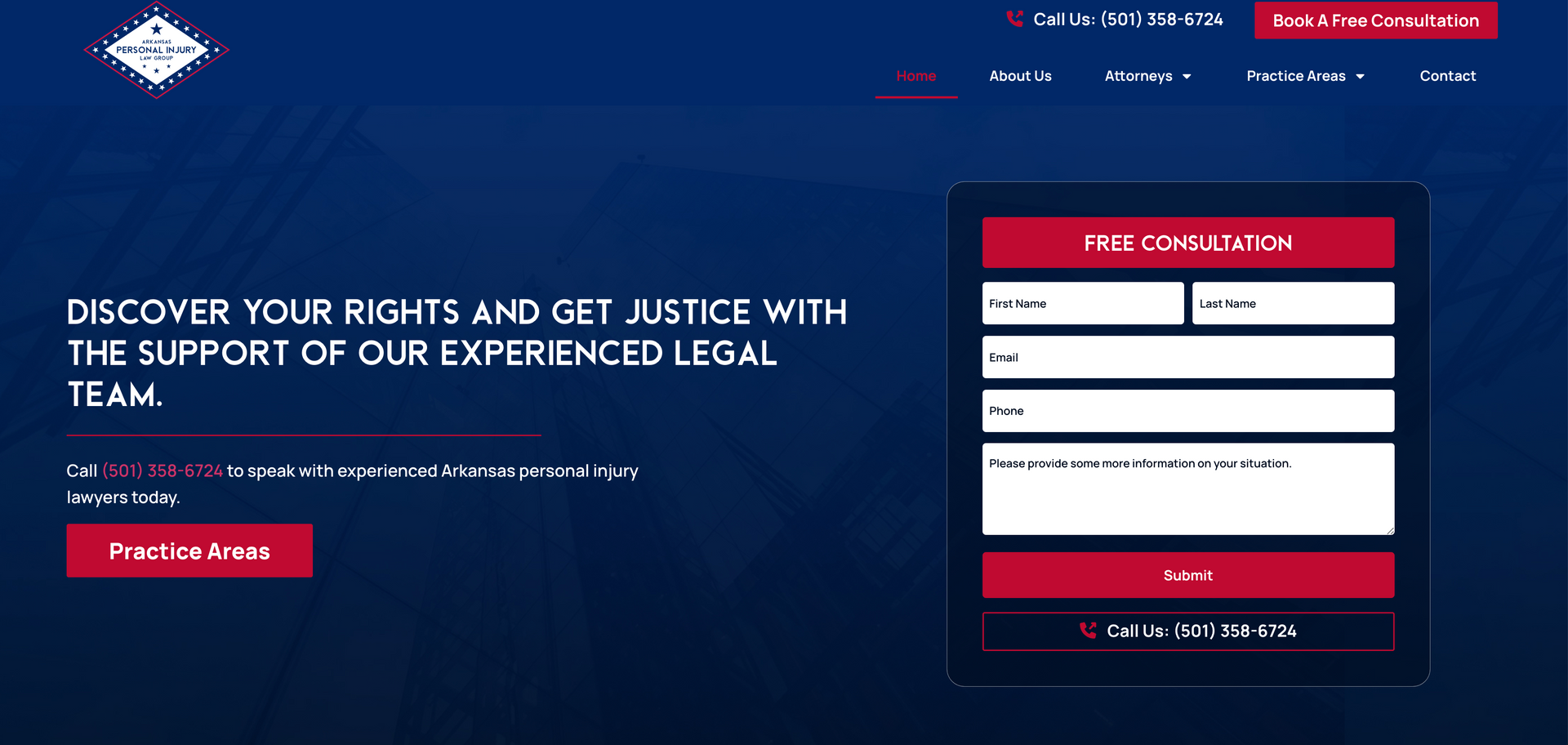Law Firm Social Media Management: A Comprehensive Guide
Scale and Sword is a leading Law Firm Social Media agency. Our experts manage Facebook, Twitter, Linkedin, Instagram, TikTok and more, effectively.In the modern digital landscape, social media has become a crucial tool for businesses across all industries, including law firms. Effective social media management can significantly enhance a law firm's online presence, client engagement, and lead generation. This comprehensive guide will explore every aspect of law firm social media management, ensuring no detail is overlooked.
Importance of Social Media for Law Firms
Social media offers law firms a unique platform to reach potential clients, engage with their audience, and build a reputable online presence. Here are several reasons why social media is vital for law firms:
- Client Engagement: Social media allows law firms to interact directly with their clients and prospects, answering questions, providing updates, and sharing valuable information.
- Brand Awareness: Regularly posting relevant content helps establish the law firm as an authority in its field, increasing brand recognition and trust.
- Lead Generation: Social media platforms can drive traffic to the firm's website, converting visitors into potential clients.
- Reputation Management: Monitoring and responding to reviews and comments on social media can help manage the firm's online reputation.
- Market Insights: Social media analytics provide valuable insights into client preferences and behavior, aiding in the development of more effective marketing strategies.
Choosing the Right Platforms
Different social media platforms cater to various demographics and types of content. Here are the most relevant platforms for law firms:
- LinkedIn: Ideal for professional networking, sharing industry insights, and connecting with other legal professionals.
- Facebook: Useful for community engagement, sharing articles, and providing updates about the law firm.
- Twitter: Best for sharing real-time updates, legal news, and engaging in industry conversations.
- Instagram: Effective for showcasing the firm's culture, sharing client testimonials, and posting visually appealing content.
- YouTube: Excellent for sharing video content such as legal advice, client testimonials, and informational videos.
- TikTok: Growing in popularity, TikTok is ideal for creating short, engaging video content that can reach a broader and younger audience. Law firms can use TikTok to share legal tips, behind-the-scenes looks at the firm, and even client success stories in a fun and engaging format.
Content Strategy
An effective content strategy is the cornerstone of successful social media management. Here’s how law firms can develop a robust content strategy:
- Identify Target Audience: Understand the demographics, preferences, and needs of your audience. This helps in creating content that resonates with them.
- Content Types:
- Educational Posts: Share articles, blog posts, and infographics that provide legal insights and tips.
- Case Studies: Showcase successful cases to demonstrate the firm’s expertise.
- Client Testimonials: Share positive reviews and testimonials to build trust.
- Behind-the-Scenes: Humanize the firm by sharing photos and videos of the team and office culture.
- Live Q&A Sessions: Engage with your audience in real-time by answering their legal questions.
- Short-Form Videos: Utilize TikTok and Instagram Reels to create short, engaging videos that capture attention quickly.
- Content Calendar: Plan and schedule posts to ensure consistent and timely content delivery. Use tools like Hootsuite or Buffer for scheduling.
- Engagement: Respond to comments, messages, and reviews promptly. Encourage discussions and interactions by asking questions and seeking feedback.
- Hashtags and Keywords: Use relevant hashtags and keywords to increase the visibility of your posts. For example, #LawFirm, #LegalAdvice, #AttorneyAtLaw.
Legal and Ethical Considerations
Law firms must navigate social media with caution to comply with legal and ethical standards. Here are key considerations:
- Confidentiality: Never disclose client information without consent.
- Advertising Rules: Ensure all promotional content adheres to the legal advertising rules in your jurisdiction.
- Professionalism: Maintain a professional tone and avoid sharing personal opinions on controversial topics.
- Compliance: Stay updated with the latest social media regulations and guidelines for legal professionals.
Measuring Success
To ensure your social media efforts are effective, it's essential to track and measure performance. Here are the key metrics to monitor:
- Engagement Rate: Measures the level of interaction with your content (likes, comments, shares).
- Reach and Impressions: Indicates how many people have seen your content.
- Follower Growth: Tracks the increase in your social media following over time.
- Website Traffic: Monitors the amount of traffic directed to your website from social media platforms.
- Lead Generation: Measures the number of inquiries or leads generated from social media activities.
Tools and Resources
Several tools can help streamline and enhance your social media management efforts:
- Social Media Management Tools: Hootsuite, Buffer, and Sprout Social for scheduling posts, monitoring engagement, and analyzing performance.
- Content Creation Tools: Canva for designing graphics, Grammarly for editing text, and Lumen5 for creating videos.
- Analytics Tools: Google Analytics for tracking website traffic, and native platform analytics (e.g., Facebook Insights, LinkedIn Analytics) for measuring social media performance.
As an agency, we use more advanced tools like Adobe Premiere and After Effects to create high-quality and customized videos. These tools allow us to produce professional-grade content tailored to our clients' needs, setting us apart from competitors who rely on more basic tools suitable for beginners.
Best Practices
To maximize the effectiveness of your social media management, follow these best practices:
- Consistency: Post regularly to keep your audience engaged and maintain visibility.
- Authenticity: Be genuine and transparent in your communications. Authenticity builds trust and loyalty.
- Quality Over Quantity: Focus on creating high-quality content that provides value to your audience rather than posting frequently with low-value content.
- Visual Content: Use images, videos, and infographics to make your posts more engaging and shareable.
- SEO Integration: Incorporate SEO best practices in your social media content to improve discoverability.
Case Studies and Examples
Examining successful case studies can provide valuable insights and inspiration. Here are a few examples of law firms excelling in social media management:
- John Onal Personal Injury: By strategic creation and regularly posting educational content and engaging with their audience on Instagram, John Onal PI increased their website traffic by 100 followers to over 3000 in 3 months.
Conclusion
Effective social media management is essential for law firms looking to enhance their online presence, engage with clients, and generate leads. By choosing the right platforms, developing a robust content strategy, adhering to legal and ethical guidelines, measuring success, and utilizing the right tools, law firms can achieve significant results. Follow the best practices and learn from successful case studies to ensure your social media efforts are impactful and sustainable.
Scale and Sword Advertising is committed to helping law firms navigate the complexities of social media management, providing tailored strategies and support to achieve their goals. Contact us today to learn how we can enhance your law firm's social media presence and drive growth.
By covering these aspects in detail, this comprehensive guide ensures that law firms have all the information they need to effectively manage their social media presence. If you need further assistance or tailored strategies, Scale and Sword Advertising is here to help.
Let’s talk about your project
Fill in the form or call to set up a meeting at 302 285 9806






